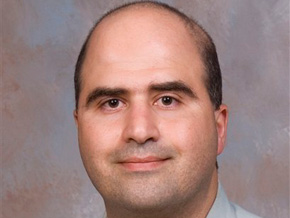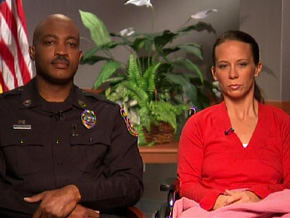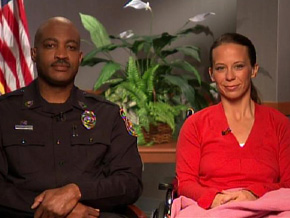The Heroes of Fort Hood

What began as a quiet day at Fort Hood, Texas, ended as the deadliest mass shooting on a military base in U.S. history. On November 5, 2009, Maj. Nidal Malik Hasan, a 39-year-old Army psychiatrist, allegedly walked into a crowded room where soldiers were getting ready for deployment and opened fire. Authorities say Maj. Hasan fired more than 100 rounds, killing 13 and injuring 43 others.
One of the first civilian police officers to arrive at the scene was Sgt. Kimberly Munley, a 34-year-old mother of two who earned the nickname "Mighty Mouse" during her military service. Authorities say Sgt. Munley fired at Maj. Hasan twice. Maj. Hasan then allegedly charged at her, firing. Sgt. Munley managed to fire a few more rounds and fell on her back, shot in each leg and her wrist.
Senior Sgt. Mark Todd, another civilian police offer with military service, joined Sgt. Munley. Together, they took down Maj. Hasan. Senior Sgt. Todd was not injured. Maj. Hasan is in stable condition and remains in custody.
Witnesses say the death toll would have been much worse if it weren't for the heroic actions of Sgt. Munley and Senior Sgt. Todd.
One of the first civilian police officers to arrive at the scene was Sgt. Kimberly Munley, a 34-year-old mother of two who earned the nickname "Mighty Mouse" during her military service. Authorities say Sgt. Munley fired at Maj. Hasan twice. Maj. Hasan then allegedly charged at her, firing. Sgt. Munley managed to fire a few more rounds and fell on her back, shot in each leg and her wrist.
Senior Sgt. Mark Todd, another civilian police offer with military service, joined Sgt. Munley. Together, they took down Maj. Hasan. Senior Sgt. Todd was not injured. Maj. Hasan is in stable condition and remains in custody.
Witnesses say the death toll would have been much worse if it weren't for the heroic actions of Sgt. Munley and Senior Sgt. Todd.

In her first interview since the shootings, Sgt. Munley says she remembers every detail of the incident. "I never lost consciousness, and I refused to," she says. "I wanted to stay awake and know everything that was going on and control my breathing to make sure I was not going to fall into shock."
Sgt. Munley says she was washing her patrol car at the end of her shift when the call about the shootings came in. Armed with a pistol, she says she entered a chaotic situation. "I was still unaware completely as to what was going on and what we were up against, who we were up against," she says. "There were many people outside pointing into the direction that this individual was apparently located, and as soon as I got out of my vehicle and ran up the hill is when things started getting pretty bad and we started encountering the fire."
Sgt. Munley says she was washing her patrol car at the end of her shift when the call about the shootings came in. Armed with a pistol, she says she entered a chaotic situation. "I was still unaware completely as to what was going on and what we were up against, who we were up against," she says. "There were many people outside pointing into the direction that this individual was apparently located, and as soon as I got out of my vehicle and ran up the hill is when things started getting pretty bad and we started encountering the fire."

Senior Sgt. Todd arrived at the scene at the same time as Sgt. Munley. "It was just a typical day, and then we got the call that shots fired," he says. "Initially in my mind I was thinking: 'Okay, this is Fort Hood. We have memorial services all the time. They were practicing the three-round volleys that they do for the memorial ceremonies.'"
Still, Senior Sgt. Todd went to investigate. "The [radio] came back saying there were shots fired while they were taking phone calls," he says.
Once inside, Sgt. Munley says there wasn't much time to think. "We get so attuned to training, and we're very fortunate that it becomes second nature and kind of reflexive for us to react," she says.
Senior Sgt. Todd managed to get the gun away from the alleged shooter. He says it was the first time he'd ever used his weapon in 25 years of law enforcement. "We're trained to shoot until there's no longer a threat. And once he was laying down on his back, his weapon just fell into his hand and I'm like, 'Okay, now's the time to rush him and secure him,'" he says. "I ran up and I kicked his weapon away and then we placed him in handcuffs, and after searching him for any other weapons and everything, we started the lifesaving measures on him."
Still, Senior Sgt. Todd went to investigate. "The [radio] came back saying there were shots fired while they were taking phone calls," he says.
Once inside, Sgt. Munley says there wasn't much time to think. "We get so attuned to training, and we're very fortunate that it becomes second nature and kind of reflexive for us to react," she says.
Senior Sgt. Todd managed to get the gun away from the alleged shooter. He says it was the first time he'd ever used his weapon in 25 years of law enforcement. "We're trained to shoot until there's no longer a threat. And once he was laying down on his back, his weapon just fell into his hand and I'm like, 'Okay, now's the time to rush him and secure him,'" he says. "I ran up and I kicked his weapon away and then we placed him in handcuffs, and after searching him for any other weapons and everything, we started the lifesaving measures on him."

When she woke up in the hospital, Sgt. Munley's first words were, "Did anybody die?" "I was very concerned as to who else had been injured as well," she says.
Sgt. Munley says she's taking her recovery slowly and is looking forward to getting back to a normal life. "Every day is a progress for me, and things are getting better day by day," she says. "Emotionally, I'm just hoping that the rest of the officers and the injured and the families of the deceased are healing as well."
Senior Sgt. Todd says he thanks God that he was able to walk away without injury. "Directly after it, I sent my wife a text and my sister a text [saying]: ' Shooting at Fort Hood. I'm okay. I'll call when I can,'" he says. "We're trained to do whatever we need to do so we can walk home at the end of the day and hug our families and just be normal people."
Sgt. Munley says she's taking her recovery slowly and is looking forward to getting back to a normal life. "Every day is a progress for me, and things are getting better day by day," she says. "Emotionally, I'm just hoping that the rest of the officers and the injured and the families of the deceased are healing as well."
Senior Sgt. Todd says he thanks God that he was able to walk away without injury. "Directly after it, I sent my wife a text and my sister a text [saying]: ' Shooting at Fort Hood. I'm okay. I'll call when I can,'" he says. "We're trained to do whatever we need to do so we can walk home at the end of the day and hug our families and just be normal people."
Keep Reading






